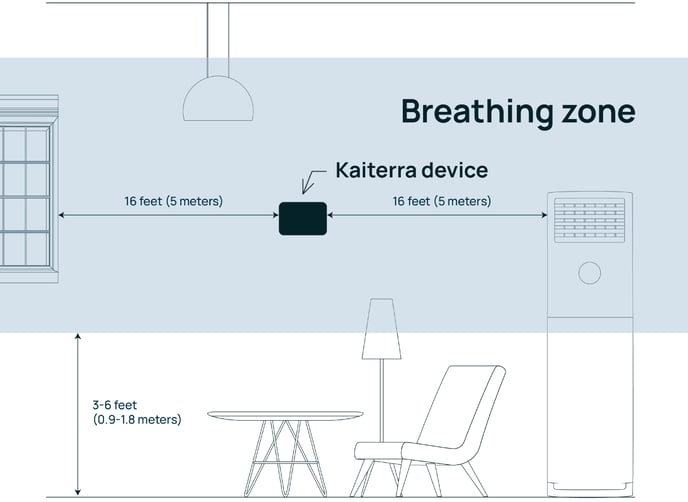Where should I install the Kaiterra Square? Should I worry about height, placement, orientation, etc.?
This article will outline our recommended installation practices.

We recommend installing the monitor in a central location of a regularly occupied space and at the eye level of your occupants and users. This space is more commonly referred to as the breathing zone and is anywhere between 3-6 feet (0.9-1.8 meters) off the ground. We also recommend installing our monitors at least 16 feet (5 meters) away from anything that may impact the airflow or readings of the device, such as HVAC diffusers, heaters, and operable windows.
Other things to consider:
- Air is drawn into the Kaiterra Square from all four sides of the device, so it is important to refrain from completely blocking off these areas as any changes in airflow may affect the readings and accuracy of our devices.
- In order to avoid direct breathing on the device, which would impact your air quality readings, try to avoid installing air quality monitors right next to a workspace, providing at least 3 feet (0.9 meters) of space between the device and any workstations. If the space does not allow this, then make sure the monitor is facing the occupants' back.
- Our air quality monitors were designed to be installed in an upright position. Please do not install our products sideways or upsidedown, as your readings will be impacted.
- Ceiling installations are also not ideal. If you are going to proceed with a ceiling installation, please keep in mind the following:
- Since your ceilings are likely above the breathing zone, your devices will be measuring the air that is not directly associated with the air that your tenants, colleagues, or customers are breathing in, making your readings less accurate according to the actual air that would impact these individuals.
- Temperature and Relative Humidity readings will especially be influenced: as hot air rises, the Temperature/Relative Humidity readings can be impacted by numerous degrees/% compared to the breathing zone levels.
- Fully recessing or embedding the Kaiterra Square during installation is not recommended as this can easily affect the airflow and accuracy of the device. If absolutely necessary, the sensor must have at least 20mm of space on all sides of the device in order to avoid impacting performance and accuracy.
Note: Building certifications, such as WELL, RESET, and LEED, may have their own requirements for things such as installation height and placement.
If your installation is pursuing any of these certifications, please make sure to check their requirements so that your Kaiterra Square is properly installed to their specifications.
If you need more assistance, feel free to get in touch!